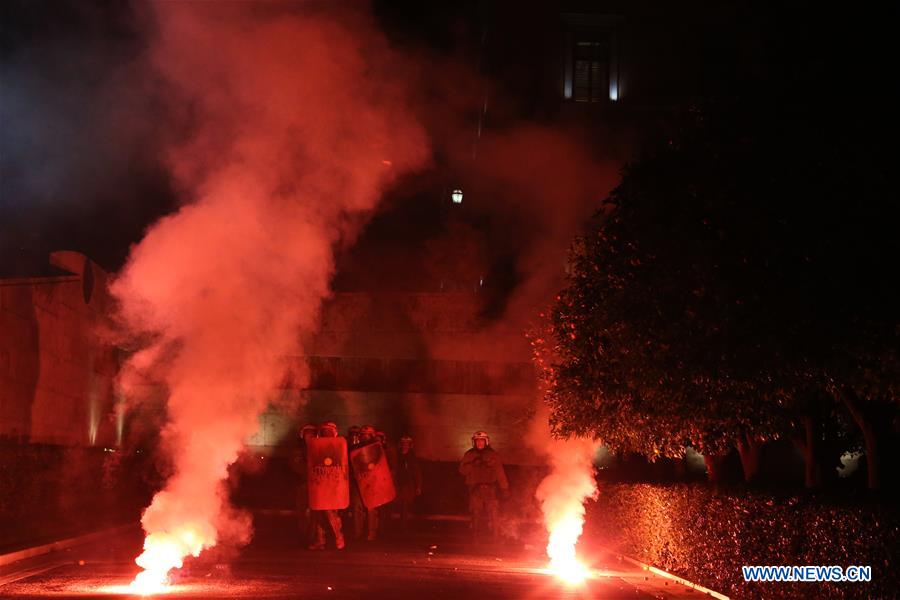
Protesters clash with police officers during a protest in Athens, capital of Greece, on Jan. 15, 2018. Greeks hit the streets here again on Monday to protest austerity as Members of Parliament (MPs) were due to vote on the latest omnibus bill legislating on dozens of prior actions required by the country's international creditors to conclude the third program review. (Xinhua/Marios Lolos)
ATHENS, Jan. 15 (Xinhua) -- Greeks hit the streets here again on Monday to protest austerity as Members of Parliament (MPs) were due to vote on the latest omnibus bill legislating on dozens of prior actions required by the country's international creditors to conclude the third program review.
The umbrella labor union of civil servants, ADEDY, which had called for a three-hour stoppage across the public sector services at noon, opened the new round of demonstrations at the parliament.
A 24-hour strike was called for public transport, while dozens of flights were affected by the air traffic controllers' work stoppage.
"We say no to policies harming peoples' interests. We resist, we demand," read banners waved by demonstrators.
Later on Monday, the union representing private sector employees GSEE, the communist party affiliated union PAME, and other labor unions were to stage more protests outside the Greek parliament.
The bill the plenary is debating foresees new cuts to family benefits, restrictions regarding the declaration of strikes, and the introduction of e-auctions for foreclosed properties.
The government aims to have the bill approved and all presidential decrees signed ahead of the next euro group meeting on Jan. 22, which could open the way for the disbursement of the next loan installment.
Cabinet ministers have admitted lately that Greeks will continue facing tightening measures after the end of the current bailout this summer, the third since 2010.
Protesters on Monday vowed to continue fighting austerity.
"They are tying a noose once again around the neck of working people," Michalis Yannakos, the president of the Panhellenic Federation of Employees in Public Hospitals told Xinhua.
"I wonder whether I will be able to support my child in his efforts in the future...Families do not want benefits to survive," Dimitra Aggeli, general secretary of the Athens Association of Families with Many Children, and mother of six children.
Yannis Paidas, member of ADEDY's executive committee, commented on the auctions of foreclosed homes, and the new rules introduced regarding strikes.
"We are absolutely opposed to the 50 percent plus one quorum. It abolishes the right to protest," he said.
Under the bill, first-level labor unions will need an absolute majority of at least 50 percent of active members who pay dues before declaring a strike in the future. Currently, the percentage stands at only one third of union members.
The quorum allowed unions to stage dozens of strikes during the past eight years of the debt crisis.
Employer's unions have supported the new strike rules, arguing that strikes have harmed the already ailing economy which is struggling to recover.
Under the bill, as of Feb. 21 auctions of foreclosed properties will be conducted only electronically. The measure is widely regarded as an attempt to avoid the protests.
Under bailout conditions, Greek banks need to reduce non-performing loans in their portfolios.
But Paidas explained that it was not as if the people who took out loans were not avoiding paying off their debts, rather they couldn't afford to.
"People took loans 10 years ago on different terms and after suffering wage cuts of 30 to 40 percent they can no longer pay their loans under the same conditions...We are asking for measures so that they will not lose their primary homes," he told Xinhua.
Nearly one in 10 public servants are struggling to pay their mortgages and risk losing their properties, he said.















